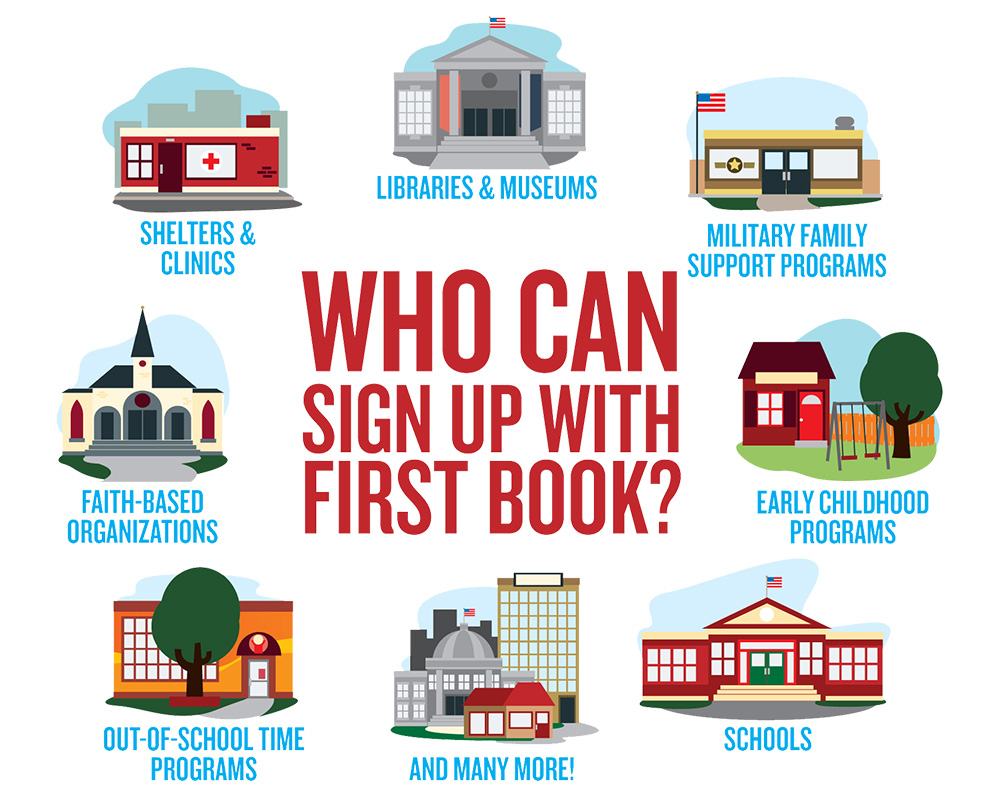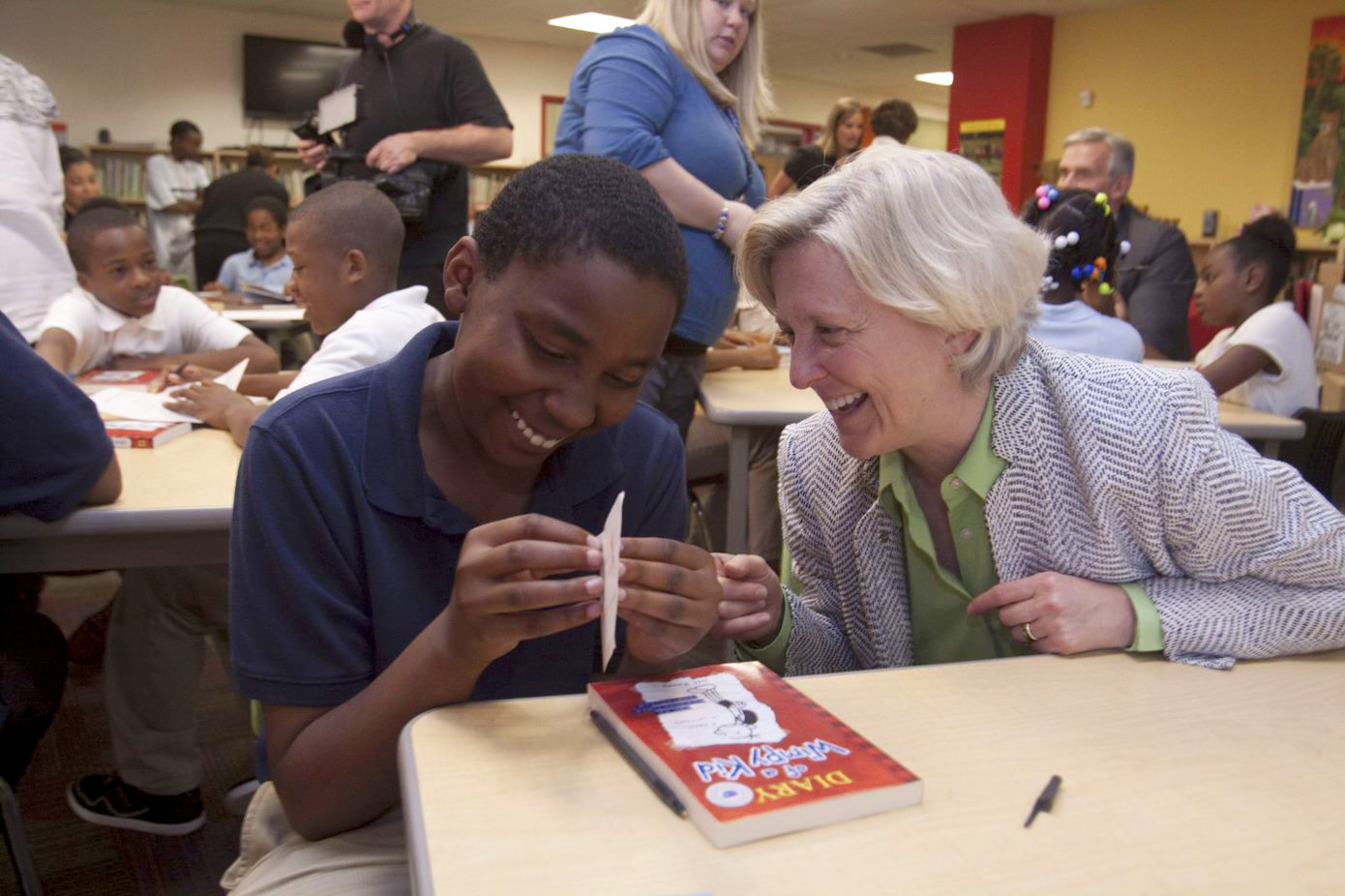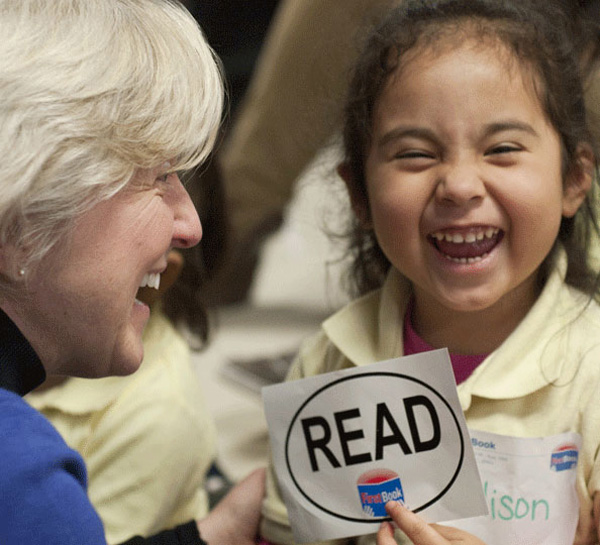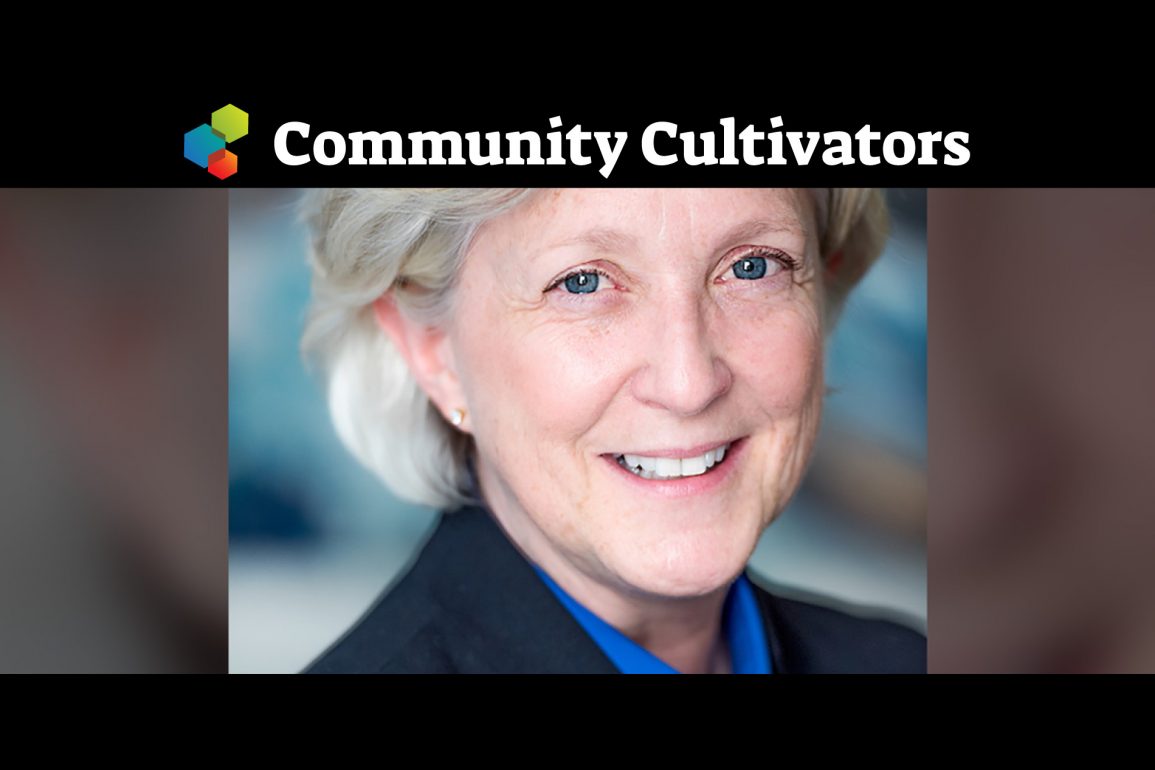In the late 1980s, as Washington, D.C., endured the crack era, Kyle Zimmer felt compelled to do something to help her neighbors in need. As a young lawyer in a private firm, she thought she understood how to get stuff done. “If you didn’t know something, you figured out how to do it,” she recalls, but the enormity of the problem perplexed her.
Zimmer’s ensuing journey led away from corporate law and onto a decades-long pursuit of educational equity. As cofounder, president, and CEO of First Book, she has cultivated a community (hence her inclusion in this series) of educators on the frontlines of the fight for economic and educational justice. Her ingenuity and what she calls her “private-sector brain” came to be indispensable in supporting educators and advancing educational opportunities for all kids.
“I’m not a teacher,” she explains. “That’s not my gift. But I know that teachers have one of the most important jobs on the planet.”
Zimmer’s nonprofit career began with volunteering at a soup kitchen, Martha’s Table, which is now a major institution in the District, but back then it was a much smaller program. Kyle had been raised with the belief that education held the key for the children’s future success, so she began to investigate. She spent some afternoons walking around neighborhoods in DC, where she asked to visit local classrooms and was simultaneously encouraged by the commitment of the teachers and shocked at the general lack of books.
👉 Check out First Book’s Early Childhood Education Resources!
With two friends, Elizabeth Arky and Peter Gold, Zimmer created a business model that allowed publishers to contribute the millions of books that become unsold inventory each year. Publishers embraced the plan to place these books in the hands of those who could most benefit from them. By using business models to aggregate the community of educators and create a market-driven approach, a social enterprise was born.

The seeds of First Book, however, were planted during Zimmer’s childhood in southeast Ohio, on the edge of Appalachia. The youngest of five, she grew up surrounded by books in a household that, most unusually for that part of the world at that time, subscribed to The New York Times.
“My mother had very definite ideas about how to be prepared for the bigger world,” Zimmer says. For example, each of the children was subjected to a dinner-party gauntlet: upon being served two fresh oysters, the expectation was that they would eat them both and say, sincerely, “Well, that’s interesting.”
 An activist as well as an etiquette taskmistress, Zimmer’s mother took her to a union hall for a meeting when the Equal Rights Amendment was up for a vote. A group of anti-ERA activists with cameras—for vaguely intimidating purposes—confronted them at the door. Instead of hiding her face, Zimmer’s mother directly engaged the men and insisted they take a “family portrait.”
An activist as well as an etiquette taskmistress, Zimmer’s mother took her to a union hall for a meeting when the Equal Rights Amendment was up for a vote. A group of anti-ERA activists with cameras—for vaguely intimidating purposes—confronted them at the door. Instead of hiding her face, Zimmer’s mother directly engaged the men and insisted they take a “family portrait.”
“That fierce belief in social justice made a major impression on me,” says Zimmer. “Her convictions ran deep and she was not ever going to be intimidated.” (The State of Ohio ratified the ERA in 1974, but it was one of only 35 to do so instead of the necessary 38; read more.)
Over the years, the allergy to injustice that Zimmer inherited has intensified, along with the willingness to take action. She still finds it incomprehensible that teachers spend about $500 a year of their own money on classroom supplies. “No other profession does that!” she laments. “Imagine a mechanic who’s expected to stop off at AutoZone to pay for parts out of his own pocket on the way to the garage.”
Of course, equal access to education is about more than books, and that’s why First Book keeps expanding, but books do matter. Life trajectories are unmistakably higher for children who grow up surrounded by them. Study after study confirms this insight.
👉 Educators: Register here for the First Book Marketplace
At this point, if you haven’t heard of First Book, or even if you have, you might be wondering: Even if publishers love books and readers, why would they agree to give product away? Aren’t they concerned about the potential lost customers and profit? The answer lies in another fact about publishing that most people don’t realize: Because of the cost of publishing books, the book industry primarily serves the upper 5 to 10 percent of our society—mostly white people in predominantly upper-class neighborhoods.
To address this challenge, First Book built a new model—one that focuses on purchasing books for the educators they serve.
- First Book’s models aggregate the voice and buying power of those serving children in need, and its focus is children ages 0-18.
- The organization negotiates the lowest prices possible from publishers and purchases that inventory in large volume – as a guaranteed, non-returnable sale.
- This enables publishers to support a new market of readers that they couldn’t previously afford to reach.
- A win for publishers and a win for educators and the children they serve.
Along the way, First Book has helped support the development of more diverse and relevant books and content—which are critical to help inspire a connection and love of reading for children in low-income communities, who need to see characters that look like them in the pages of books. First Book’s efforts to drive access to diverse titles helps reduce the risk for publishers.
 “If we buy 10,000 copies of a title,” Zimmer says, “that’s a big deal,” and that purchase can help publishers expand their print run to bring the same book to the retail market. For example, when educators in the First Book community said that they needed a bilingual edition of Eric Carle’s The Very Hungry Caterpillar, First Book worked with the publisher to create a bilingual edition that had never existed before—and it is now also available to retail consumers.
“If we buy 10,000 copies of a title,” Zimmer says, “that’s a big deal,” and that purchase can help publishers expand their print run to bring the same book to the retail market. For example, when educators in the First Book community said that they needed a bilingual edition of Eric Carle’s The Very Hungry Caterpillar, First Book worked with the publisher to create a bilingual edition that had never existed before—and it is now also available to retail consumers.
In 2014, the National Book Foundation presented Zimmer with its prestigious Literarian Award for “her outstanding leadership and achievements in overcoming childhood illiteracy and promoting educational equality.” Previous recipients included Maya Angelou, Dave Eggers, Lawrence Ferlinghetti, Joan Ganz Cooney, Terry Gross, Mitchell Kaplan, Barney Rosset, and Arthur O. Sulzberger, Jr.
First Book’s online community consists of 450,000 educators at schools and programs of all sizes—and it’s growing by 1,000 every week. It’s free to join. The only requirement is that 70 percent of the children and families they serve must be low income. “Each educator who is part of the First Book Network not only has access to best-in-class resources—available to them for free or at the lowest prices possible, but they also add their voice to shape and drive the development of new resources they need for the children they serve,” says Zimmer.
First Book has grown to consist of three models:
- The First Book Marketplace – with everything a teacher needs, starting with but not limited to books. The educator community has access to books, school supplies, hygiene kits, winter coats and other necessities at deep discounts. Educators: Register here for access to this unparalleled resource.
- Research and Insights, First Book’s research arm focused on understanding what’s needed to support the diffuse population of people who devote their lives to kids in need. “There’s no other organization that amplifies the voice of this broad group of educators,” Zimmer says, adding that while teacher unions play an essential role, the First Book community includes anybody who serves children and families in low-income communities.
- First Book Accelerator, which is focused on bringing promising, evidence-based strategies to fruition in less time. Educators shouldn’t miss free downloadable resources, including ones on social & emotional learning; promoting early literacy; and getting ready for kindergarten. Zimmer notes that while companies like Apple go from concept to product in months, it can take 15 to 20 years for education ideas to take hold. “We are holding hands with leading subject matter experts to expedite resources that address key issues educators tell us they see, like trauma, unconscious bias, and ways to promote empathy and understanding in their classrooms. Educators can’t wait 10 years; they need these resources right now.”
What’s next for First Book? That depends on the members. “This entire organization is built on their feedback,” Zimmer says.
These titles earned fives stars from educators in the First Book Network:
- The Benefits of Being an Octopus by Ann Braden
“This title follows the journey of Zoey, a girl raised in poverty and chaos, as she learns to claim space in the world and see herself as worthy. My students and I love it.”—Wendy G - Yasmin the Fashionista by Saadia Faruqi, illustrated by Hatem Aly
“Our school has so many Muslim families but the options for representation in literature for early readers is limited. These books were a hit! Parents were asking where to buy copies for their home libraries. Grandparents are positively represented in several of the books as well. The art is FABULOUS.”—Sheila B. - Potato Pants! by Laurie Keller
“If you are looking for a hilarious, laugh out loud perfect read aloud for K-5, this book is potato-ey perfect! Laurie Keller doesn’t disappoint with her humor, word play and fantastic author’s message. I read this aloud 20 times in our school library and the kids ALL loved it!”—Colleen M. - Darius the Great Is Not Okay by Adib Khorram
“This is a such a tender story that focuses on one young man’s struggle to not only see who he is, but who he is in this world. It is such a touching tale of family, friendship, and how even though we may live worlds apart, there is acceptance and understanding to be had. This is a great book for any student struggling to find where they are in this world.”—Brian M. - Baby 101: Anatomy for Babies by Jonathan Litton, illustrated by Thomas Elliott
“Great book for moms to read to ages 0-3. Has a lot of great colorful pictures. Great way of explaining to toddlers their anatomy and how it works. AWESOME!”—Patrice A. - The Girl With a Mind for Math: The Story of Raye Montague by Julia Finley Mosca, illustrated by Daniel Rieley
“I used the book for the beginning of the year to immerse the students into the minds of great mathematicians. It was exciting for the 4th and 5th graders to listen to a story about a person who had to overcome a lot of obstacles to pursue her dream. It also opened up the minds of my female students to pursue math.”—Erin I. - Lu by Jason Reynolds
“The Track Series is a popular read in my classroom library. My students have been anxiously awaiting the fourth book. They have devoured it within days of reading it. If you do not have these series in your classroom library, you must get it. My reluctant readers and my engaged readers love it.”—Anna F. - The Wind Called My Name by Mary Louise Sanchez
“So far my students have loved this book! Having many students of diverse cultures, many of whom are immigrants or first generation born here, it is easy to relate to, and one of the books that they seem not to be able to put down. It is full of history, facts, culture and adventure. I would definitely recommend this book to add to your classroom libraries.”—Joann D. - The Bridge Home by Padma Venkatraman
“Whether you teach later elementary or middle grades, you need this touching read in your classroom library. A great read for kids who need to find their own sense of family, or who have to ‘adult’ too much, or who are grieving a loss.”—Kristine P. - The Day You Begin by Jacqueline Woodson, illustrated by Rafael López
“This was the most beautiful book that I have read in years! I believe that this book will hit a chord with every single child that reads it and it will give many the courage that they need to face each day. If you only buy one book all year, this is the one to get!”—Lenna B.

Mark Swartz
Mark Swartz writes about efforts to improve early care and education as well as developments in the U.S. care economy. He lives in Maryland.



